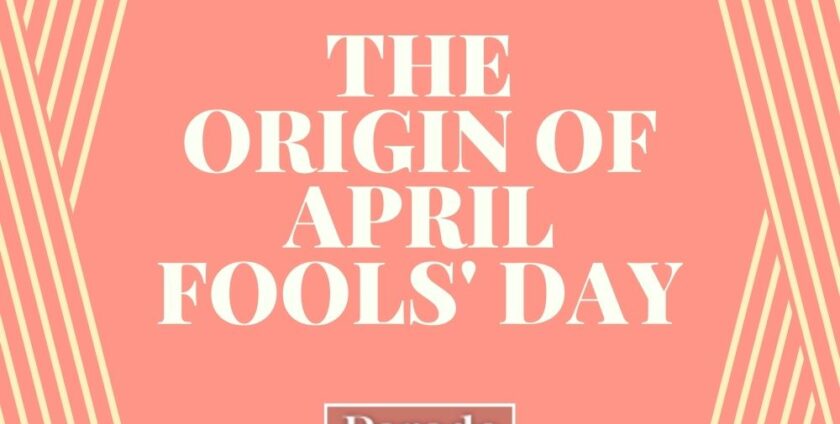
“April Fools!” is an expression most people become aware of at a very young age. After all, the infamous day of pranks and anticipatory high jinks is firmly ingrained in society. However, when it comes to the exact origin of April Fools’ Day, the joke’s on us. Why’s that? Nobody actually knows!
What is the origin of April Fools’ Day?
Some credit the ancient Roman festival of Hilaria as the inspiration of April Fools’ Day. Hilaria took place at the end of March and was a day of joy, merriment, and dressing up in disguises. However, because there is no direct link between the two events, the origin and history of this centuries-upon-centuries-old celebration is still a complete mystery.
There have been questions about April Fools’ Day’s origin and history since long before some of us would even assume the day was observed. For example, back in 1708, the British Apollo magazine asked, “Whence proceeds the custom of making April Fools?” So, while it’s rather fitting that the day itself would pull one over on us and end up with the last laugh, we do still have a very long history of April 1 references, as well as incredibly interesting established traditions around the world to commemorate this day.
It’s bizarre to think about just how long people have been tricking each other as a way to celebrate the first day of April. One of the earliest documented references of April Fools’ Day comes from Eduard de Dene, a Flemish writer who published a poem in 1561 about a man who sent his servant on bizarre errands all day long on April 1. The servant eventually realized that he was part of an April 1 joke as the day progressed.
Writer John Aubrey referred to April 1 as “Fooles holy day,” in 1686. And just a few years later, in 1698, a newsletter reported on April 2: “Yesterday being the first of April, several persons were sent to the Tower Ditch to see the lions washed.” This broad invitation to a lion-washing ceremony was the first recorded antic of this kind, but it became a very popular prank, especially against out-of-towners.
During the 18th century, April Fools’ Day was accepted by Britain. In Scotland, they began holding two-day celebrations of this pranking day and called it “hunting the gowk,” a “gowk” being their name for cuckoo bird or fool. People were sent on ridiculous errands. I’m sure they had a blast.

Why is April Fools’ Day April 1?
One origin story starts in France, where one source states that April Fools’ Day may have begun as far back as 1582 and explains why April 1 is the special date. That’s when France switched from the Julian to the Gregorian calendar. And, no, this isn’t the funny part. Evidently, some folks didn’t hear about the calendar change, which came about because of the Council of Trent in 1563. So they didn’t know that they were supposed to start the new year on January 1 instead of April 1, as had been done in the past. According to Snopes.com, French peasants would go to their neighbors’ houses to pretend they were playing a New Year’s Day call on them. If the people really thought it was the start of the new year, they were considered April fools. This is a fun story, but as noted above, some historic references to April Fools’ Day date before 1582.
Some historians think that April Fools’ Day somehow ties into the vernal equinox, when Mother Nature was said to fool people with the quickly changing weather.
How do cultures around the world celebrate April Fools’ Day?
While there is familiarity with April Fools’ Day all around the globe, different areas have their own long-standing traditions that set them apart. What unites them is that no matter the history and origins, the pranking takes place on April 1.
For example, in France, April 1 is known as “poisson d’avril” or “April Fish,” and the goal of the day is to attach a paper fish to someone’s back without being noticed. The Polish tradition takes April 1 very seriously, with individuals, the media, and public institutions getting involved in elaborate hoaxes. The Irish also celebrate on April 1, and would traditionally have someone bring an important letter to one person, just to have a note inside with the direction: “Send the fool farther,” and would then tell the messenger to bring it to another named person.
And did you know that people pulling April Fools’ Day pranks are supposed to do them before noon on April 1 or they are welcoming bad luck into their lives? I guess folks could argue that it’s noon somewhere and continue to play jokes on friends and family throughout the day, but in the UK, anyone who tries to play a prank after 12PM is actually considered the fool instead!
How do brands get in on the April Fools’ Day action?
Keep your eyes and ears open on April Fools’ Day each year as the media and companies love to get involved. Who can forget the year that Canada said it was coming out with a $2 coin or when Burger King said it was now selling a left-handed Whopper…and folks actually asked for it.
The best prank of all? In 1957, the BBC’s Panorama said that with spring coming early, the Switzerland spaghetti harvest would be early too. They then showed women in the background who looked to be picking spaghetti from trees.
Tons of viewers called the BBC to find out where they could buy spaghetti plants.
How gullible…
Although the origin of “April Fools’” is ultimately unknown, its fascinating history is filled with amusing traditions all around the world that can still inspire us today with our own April 1 shenanigans and spoofs!
Original post: https://parade.com/985732/kelseypelzer/april-fools-day-origin/




